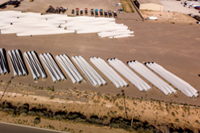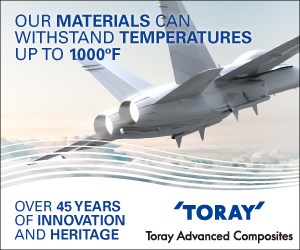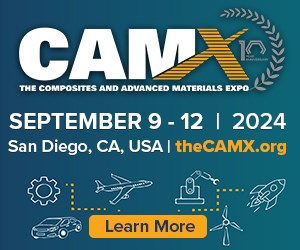Mikrosam launches automation for production of hydrogen, CNG tanks
A new production line will combine filament winding and automation to produce more than 60,000 tanks annually for the automotive industry.

Reference design in production of an automated line for compressed hydrogen and natural gas tanks. Source | Mikrosam
Mikrosam (Prilep, Macedonia) is launching new automation capabilities for filament winding of compressed hydrogen and compressed natural gas (CNG) tanks, and says it has been awarded a contract with JSC DPO Plastik (Dzerzhinsk, Russia) to deliver one of the largest production lines for the automotive industry. The line will include Mikrosam’s multi-spindle filament winding machines integrated with new automation units to produce more than 60,000 tanks annually.
As part of this contract, Mikrosam will deliver its multi-spindle filament winding machines for wet and tow-preg winding, which are said to enable fast and precise winding of glass and carbon fibers. These multi-spindle machines are designed to build tanks between 40- and 350-liter in capacity for storage of compressed hydrogen and compressed natural gas. They feature Mikrosam's patented automated cut and restart system, double-drive carriage for high-speed and high-precision tow-preg winding, and an original shaft design for pressure vessels. This system is said to allow for programed and continuous control of pressure inside the tank liners during each layer of winding. Additionally, during wet winding the resin mixing, delivery to resin bath, and resin deposition on fibers is said to be finely controlled.
To achieve high scale and maximize equipment utilization, the production line features a dynamic load-balancing system said to ensure winding of four or more multi-spindle filament winding machines simultaneously. This dynamic load balancing reportedly provides higher overall utilization than simply having many filament winding machines on the floor. This automation is enhanced with Mikrosam equipment such as:
- a liner preparation station,
- a visual inspection and buffer station,
- an automated resin mixing and delivery system,
- a continuous curing oven,
- a multi-robot handling system,
- a cylinder drop-off station, and
- a cylinder preparation station for testing purposes.
All units are fully integrated with a robot-based handling system and a Top-Level Control System (TCON). The robot-based handling units control and measure the weight of the tanks at each stage of the process, from plastic liner to post-curing. Mikrosam’s TCON software system collects details of process parameters at each step of production in a data warehouse, even collecting data from third-party auxiliary equipment such as blow molding and testing equipment. The software is said to integrate the data into the factory ERP to ensure traceability and quality improvement while giving customers unlimited reporting capabilities.
“After reviewing many competing offers, we are very happy to select Mikrosam as the best and most reliable supplier with proven productivity track record offering highest ROI on such scale,” says Irina Shevtsova, chairman, board of directors of JSC DPO Plastik. “[An] additional plus is that Mikrosam has excellent relationships with third parties whose equipment will be integrated. Our estimations show such integration can achieve lowest total cycle-time with maximum quality level, not just on filament winding equipment but on the complete production line.”
“This new line, with so many new innovative units, speaks to our leadership in composite manufacturing automation for growing new markets,” says Dimitar Bogdanoski, sales manager at Mikrosam DOO.
Related Content
-
Novel dry tape for liquid molded composites
MTorres seeks to enable next-gen aircraft and open new markets for composites with low-cost, high-permeability tapes and versatile, high-speed production lines.
-
Sulapac introduces Sulapac Flow 1.7 to replace PLA, ABS and PP in FDM, FGF
Available as filament and granules for extrusion, new wood composite matches properties yet is compostable, eliminates microplastics and reduces carbon footprint.
-
Carbon fiber in pressure vessels for hydrogen
The emerging H2 economy drives tank development for aircraft, ships and gas transport.

.jpg;width=70;height=70;mode=crop)














